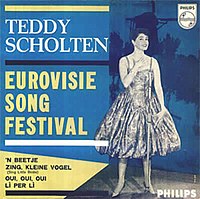Een beetje
|
|
|
|---|---|
 |
|
| Eurovision Song Contest 1959 entry | |
| Country | |
| Artist(s) | |
| Language | |
| Composer(s) |
Dick Schallies
|
| Lyricist(s) |
Willy van Hemert
|
| Conductor | |
| Finals performance | |
| Final result |
1st
|
| Final points |
21
|
| Appearance chronology | |
| ◄ "Heel de wereld" (1958) | |
| "Wat een geluk" (1960) ► | |
"‘n Beetje" (A little bit), spelled in full as "Een Beetje", was the winning song of the Eurovision Song Contest 1959. Performed in Dutch by Teddy Scholten, the song was the second victory for the Netherlands in the first four years of the contest's history.
The song is more up-tempo than the previous winners had been, as well as being somewhat less serious. It is sung from the perspective of a young woman being asked by her lover if she is "true" and "faithful", to which she answers "A little bit". This unusual admission is then justified by the comment that "everyone is in love at least once", hence nobody can be said to be entirely faithful to anyone. Befitting the lyrics, the music has a lilt to it which had been missing from the previous winners. Scholten also recorded the song in German (as "Sei ehrlich"), French ("Un p'tit peu"), Italian ("Un poco") and Swedish ("Om våren"). She sang an English version for British television as "The Moment".
The song was performed fifth on the night, following Monaco's Jacques Pills with "Mon ami Pierrot" and preceding Germany's Alice and Ellen Kessler with "Heute Abend wollen wir tanzen geh'n". By the close of voting, it had received 21 points, placing it first in a field of 11.
The song was succeeded as contest winner in 1960 by Jacqueline Boyer singing "Tom Pillibi" for France.
It was succeeded as Dutch representative at the 1960 Contest by Rudi Carrell with "Wat een geluk".
...
Wikipedia
